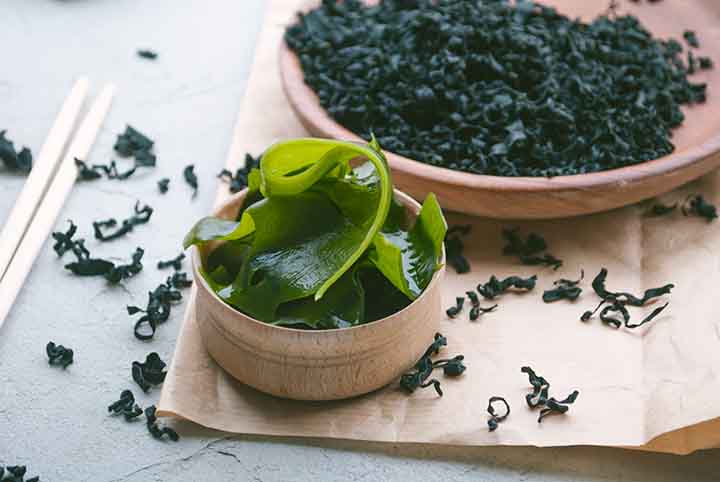Seaweed

What is Seaweed?
Seaweed (hai zao, 海藻) is a form of algae that grows in the sea. It is a food source for ocean life, and it ranges in colour from red, green, brown to black. Seaweed usually grows along rocky shorelines around the world, and it is most commonly eaten in Asian countries such as Japan, Korea and China. Extremely versatile, this herb can be used in many dishes, including but not limited to sushi rolls, soups, stews, salads, supplements and smoothies.
In addition to its culinary uses, Seaweed is important for its medicinal uses too. Most Seaweed is high in Vitamin B12 and Iodine. Other minerals found in seaweed include copper, iron, magnesium, calcium, potassium, and zinc. It is precisely the fact that Seaweed contains all of these nutrients that gave it the nickname of “Nature’s Treasure Chest.”
Cold in nature, Seaweed can help individuals who have too much Heat in their body, such as those who have Yang Excess or Yin Deficiency, to restore a healthy yin-yang balance. Salty in taste, Seaweed has a draining effect on the body by clearing accumulations, removing Phlegm and softening hard lumps. In particular, this herb targets the Liver, the Kidneys and the stomach.
Functions and Benefits of Seaweed
Traditional Chinese Medicine (TCM) shows that Seaweed includes the following health benefits:
Seaweed can dissolve Phlegm, soften hardness and dissipate nodulation. Hence, it is often indicated for scrofula, goiter, swollen and painful testis resulting from Phlegm and Qi accumulation. Also, Seaweed can induce diuresis and resolve swelling to alleviate edema and relieve downward flow of damp turbidity to the foot.
Seaweed can help to relieve syndromes of Yin Deficiency by nourishing your yin and encourage the production and movement of fluid. Through lubrication, moistening and cooling, Seaweed can relieve symptoms such as menopausal symptoms, hot flashes, low back pain, night sweats, poor memory, fatigue, ear ringing, dry skin and the loss of vaginal lubrication.
As Seaweed contains Iodine and Tyrosine, it is suggested that Seaweed can support thyroid function. As the thyroid gland releases hormones to help control growth, energy production, reproduction and the repair of damaged cells in your body, Seaweed can then help to boost weight loss, reduce fatigue and address swelling of the neck over time.
Containing a variety of protective antioxidants, Seaweed can prevent damage by free radicals in your body, and thus lowers the risk of diseases such as diabetes and heart disease.
Other than the above Seaweed benefits, this herb also provides fibre and polysaccharides that can support gut health. In addition, Seaweed may assist in weight loss by controlling your appetite to reduce feelings of hunger. By improving blood sugar management, the herb can also reduce the risk of Type 2 Diabetes.
Packed with lots of nutrition, Seaweed is also said to be great for the skin, hair, teeth and bones.
How to Use Seaweed
Most healthcare practitioners will recommend a dosage of 4.5 – 15g for dried Seaweed, ground up into a decoction with boiling water. However, the exact amount of Seaweed to be taken depends on the exact condition being treated.
Seaweed is available to us in a wide variety of forms, ranging from thin, dried sheets of Seaweed to powders, pills and capsules. They can be purchased from many sources, such as most supermarkets, nutrition stores, herbal stores and Asian markets.

Cautions and Side Effects of Seaweed
Seaweed contradicts the properties of Licorice Root. Hence, Seaweed and Licorice Root should not be taken together or used together in a herbal formula. Also, Seaweed should be used with caution by individuals experiencing Deficiency of Spleen Qi or stomach Qi.
As Seaweed may help blood cells to coagulate, patients who are taking blood-thinning medications should also use this herb with caution. Also, as Seaweed contains a large and potentially dangerous amount of Iodine, we must look out for our iodine intake and make sure that we do not exceed its tolerable upper limit (1,100 mcg) for adults.
You can combine Seaweed with foods that inhibit the uptake of Iodine by the thyroid gland. Examples of such food include broccoli, cabbage and bok choy.
In addition, as Seaweed can absorb and store minerals in concentrated amounts, it can also contain large amounts of toxic heavy metals such as cadmium, mercury and lead. While most seaweed contains metal content that is below the maximum concentration allowances in most countries, if you consume Seaweed regularly, there is still a potential for heavy metals to accumulate in your body over time.
Whenever possible, buy organic Seaweed as it is less likely to contain large amounts of heavy metals.
Summary
Here is a summary for Seaweed:
- Herb name (Chinese): 海藻
- Herb name (Pin Yin): hǎi zǎo
- Herb name (English): Seaweed
- Herb name (Botanical): Sargassum
- Origin of species: Sargassum pallidum (Turn.) C. Ag.; Sargassum fusiforme (Harv.) Setch.
- Part(s) of herb used: Algae body
- Geo-specific habitat(s): Liaoning, Shandong, Fujian, Zhejiang, Guangdong
- Taste(s) & Properties: Salty; Cold; Administrates the Kidney and Liver Meridians
- Actions: Eases pain experienced in swollen testes or glands, or abnormal tissue growth; Relieves symptoms of water retention in the body
References
Adams, J. D., & Lien, E. J. (Eds.). (2015). Traditional Chinese Medicine: Scientific basis for its use. Royal society of chemistry. [Accessed on 30th October 2022]
Brownlee, I., Fairclough, A., Hall, A., & Paxman, J. (2012). The potential health benefits of seaweed and seaweed extract.[Accessed on 30th October 2022]
Oshima, E. (2013). Medicinal uses of seaweed in traditional chinese medicine. Traditional Chinese Medicine: Scientific Basis for Its Use (31), 238.[Accessed on 30th October 2022]
Rajapakse, N., & Kim, S. K. (2011). Nutritional and digestive health benefits of seaweed. Advances in food and nutrition research, 64, 17-28.[Accessed on 30th October 2022]
Share this article on
